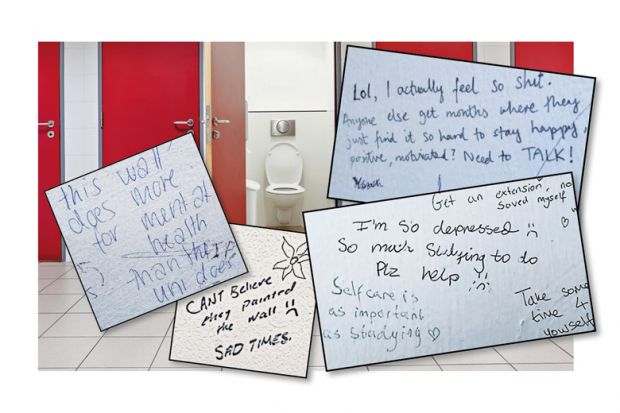Graffiti in university toilets is often dismissed as inane, unsightly or straight-out vandalism, but might it also be a vital source of support for students struggling with their mental health?
That is the contention of sociolinguist Mabel Victoria, who spent 10 months recording and analysing the scrawls that appeared in a women’s bathroom at Edinburgh Napier University, where she is a lecturer.
Despite the university painting over the graffiti several times throughout this period, students continued to write their thoughts on everything from exams and dissertations to Brexit and student protests in Hong Kong, explains Dr Victoria in a recent paper in the journal Innovative Higher Education.
Most of the graffiti was, however, words of encouragement for other female students, or people updating each other on their own mental well-being, says Dr Victoria, who took the title of her paper, “This Wall Does More for Mental Health than the Uni Does”, directly from a student comment.
Campus resource collection: Well-being in higher education
“Even though our university offers lots of support to students, this cold and grubby wall mattered hugely for many students,” Dr Victoria told Times Higher Education.
“Nowadays students can use Instagram or Facebook to talk to each other, so I was surprised that many still want to use pens and pencils to communicate like this,” she continued, saying the warmth of the graffiti conversations, which offered advice and encouragement, led her to document the messages.
“Most graffiti studies tend to focus on the gender differences of graffiti, and how men’s graffiti is ruder. That seems fairly predictable and uncontroversial. But what was interesting here was the emotional attachment that students had to this wall as a way to support each other,” said Dr Victoria.
In her paper, Dr Victoria states that toilet graffiti had the “potential to yield more authentic values and opinions than traditional ways of directly soliciting opinions from students via surveys or interviews which might make them feel hesitant and uncomfortable”.
It could, she suggests, be used as an “additional tool to learn about the prevailing sentiments and attitudes”.
So should universities rethink their policies of removing toilet graffiti and instead seek to learn from it, or even encourage it?
“That’s a difficult question,” said Dr Victoria. “I did speak to cleaners who were very angry about this graffiti – they felt it was unsightly and dirty, and came from nothing more than boredom.
“I understand this view and graffiti is illegal, but I think universities should allow some space – maybe not a toilet, but somewhere informal that simulates the privacy of a restroom – where students can write these messages.”
后记
Print headline: Loo graffiti offers campus solace




